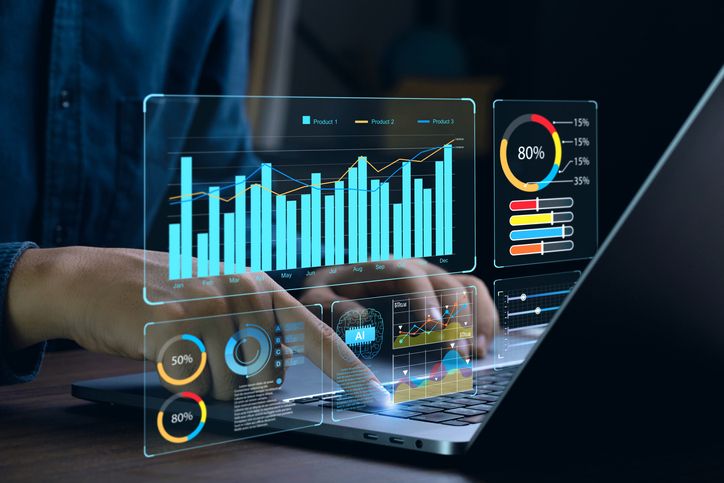

In today’s rapidly evolving digital landscape, artificial intelligence (AI) has emerged as a game-changing force in the world of marketing. As businesses strive to stay ahead of the curve and maximize their sales potential, AI-powered solutions are becoming increasingly prevalent. Let’s learn more about this topic below with 2048 Unblocked. From personalized recommendations to predictive analytics, AI is revolutionizing the way companies connect with their target audience and drive conversions.
Artificial intelligence has quickly become an indispensable tool for marketers seeking to gain a competitive edge in an increasingly crowded marketplace. By leveraging machine learning algorithms and big data analytics, businesses can now gain unprecedented insights into consumer behavior, preferences, and purchasing patterns. This wealth of information enables marketers to craft highly targeted campaigns that resonate with their audience on a deeply personal level.
One of the key advantages of AI in marketing is its ability to process and analyze vast amounts of data in real-time. This allows companies to make data-driven decisions quickly and efficiently, adapting their strategies on the fly to maximize their return on investment. Moreover, AI-powered marketing tools can automate many time-consuming tasks, freeing up human marketers to focus on more creative and strategic aspects of their work.
Read more: Future Tech That Will Change the Way We Live
Perhaps one of the most significant impacts of AI on marketing has been its ability to deliver personalized experiences at scale. By analyzing user data and behavior, AI algorithms can create highly tailored content, product recommendations, and offers for individual consumers. This level of personalization was once only possible for small businesses with a limited customer base, but AI has made it achievable for even the largest enterprises.
For example, e-commerce giants like Amazon and Netflix use sophisticated AI algorithms to recommend products and content based on a user’s browsing history, purchase behavior, and preferences. These personalized recommendations not only enhance the user experience but also drive sales by presenting customers with items they are more likely to be interested in purchasing.
AI-powered predictive analytics tools are revolutionizing the way marketers segment their audience and forecast future trends. By analyzing historical data and identifying patterns, these tools can predict which customers are most likely to make a purchase, what products they might be interested in, and when they are most likely to buy. This information allows marketers to create highly targeted campaigns that reach the right people at the right time with the right message.
Furthermore, AI can help businesses identify new customer segments and niche markets that may have been previously overlooked. By uncovering hidden patterns in consumer data, AI algorithms can reveal valuable insights about untapped opportunities and emerging trends, enabling companies to stay ahead of the curve and capitalize on new market segments.
Content marketing has become an essential component of any successful digital marketing strategy, and AI is playing an increasingly important role in this arena. From generating personalized content to optimizing existing materials for search engines, AI tools are helping marketers create more engaging and effective content at scale.
Natural Language Processing (NLP) technology has made significant strides in recent years, enabling AI systems to understand and generate human-like text. This has led to the development of AI-powered content generation tools that can create everything from product descriptions and social media posts to full-length articles and reports.
While these tools are not yet capable of completely replacing human writers, they can significantly speed up the content creation process and provide valuable assistance to marketing teams. For example, AI can help generate initial drafts, suggest headlines and topics, and even adapt existing content for different platforms or audiences.
AI is also transforming the way marketers approach search engine optimization (SEO) and content performance analysis. By analyzing vast amounts of data from search engines, social media platforms, and website analytics, AI tools can provide valuable insights into keyword trends, content gaps, and audience preferences.
These insights allow marketers to optimize their content for better search engine rankings and create more engaging materials that resonate with their target audience. Additionally, AI-powered tools can analyze the performance of existing content and provide recommendations for improvement, helping marketers continually refine their strategies and maximize their content’s impact.
In today’s hyper-connected world, customers expect instant responses and personalized support from the brands they interact with. AI-powered chatbots and virtual assistants are revolutionizing customer service by providing 24/7 support, handling routine inquiries, and even assisting with sales and product recommendations.
These AI-driven solutions not only improve customer satisfaction by providing quick and accurate responses but also free up human customer service representatives to focus on more complex issues that require empathy and nuanced problem-solving skills. Moreover, chatbots and virtual assistants can gather valuable data about customer preferences and pain points, which can be used to improve products, services, and marketing strategies.
AI is also transforming the way businesses monitor and engage with their audience on social media platforms. By leveraging natural language processing and machine learning algorithms, AI tools can analyze social media posts, comments, and reviews to gauge customer sentiment and identify emerging trends or potential issues.
This real-time insight allows marketers to quickly respond to customer feedback, address concerns, and capitalize on positive sentiment. Additionally, AI-powered social media monitoring tools can help businesses identify influencers and brand advocates, enabling more effective influencer marketing campaigns and community-building efforts.
Read more: Exploring the Ethics of Artificial Intelligence
As AI technology continues to evolve, its impact on marketing is only expected to grow. From advanced predictive modeling to more sophisticated personalization techniques, the future of AI in marketing holds immense potential for businesses looking to stay ahead of the curve.
One of the most exciting developments in the field of AI marketing is the integration of AI with other emerging technologies such as augmented reality (AR), virtual reality (VR), and the Internet of Things (IoT). These combinations have the potential to create immersive, highly personalized marketing experiences that blur the lines between the digital and physical worlds.
For example, AI-powered AR applications could allow customers to virtually try on clothing or visualize furniture in their homes before making a purchase. Similarly, IoT devices connected to AI systems could provide valuable data about consumer behavior and preferences, enabling even more targeted and relevant marketing campaigns.
While the potential benefits of AI in marketing are undeniable, it’s important to acknowledge the ethical considerations and challenges that come with this technology. As AI systems become more sophisticated and have access to increasingly large amounts of personal data, concerns about privacy, data security, and algorithmic bias have come to the forefront.
Marketers must be mindful of these issues and work to ensure that their AI-powered marketing efforts are transparent, ethical, and respectful of consumer privacy. This may involve developing clear data usage policies, implementing robust security measures, and regularly auditing AI systems for potential biases or unintended consequences.
In conclusion, AI is revolutionizing the world of marketing, offering unprecedented opportunities for personalization, optimization, and customer engagement. As the technology continues to evolve, businesses that embrace AI-powered marketing solutions will be well-positioned to stay ahead of the competition and drive sales in an increasingly digital marketplace. However, it’s crucial for marketers to approach AI adoption with a balanced perspective, considering both the immense potential and the ethical implications of this powerful technology.
By leveraging AI responsibly and creatively, businesses can create more effective, engaging, and personalized marketing campaigns that resonate with their target audience and drive long-term success. As we move forward into an AI-driven future, the most successful marketers will be those who can harness the power of smart algorithms while maintaining a human touch and a commitment to ethical practices.